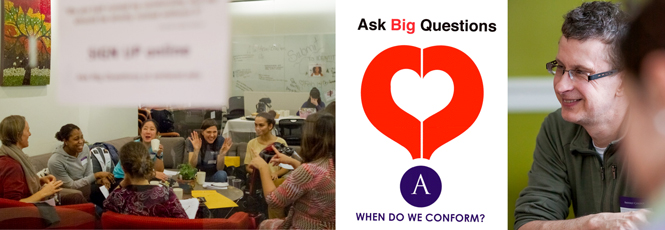By Katherine Duke ’05
Earlier this semester, mysterious signs began to pop up around the Amherst campus. A banner above the entrance to Frost Library asked WHEN DO WE CONFORM?. Posters appeared on every bulletin board, featuring question marks and the letters ABQ. Many people didn’t know what to make of them. One evening in Valentine Dining Hall, I overhead one Breaking Bad fan mutter to another, “Does that stand for ‘Albuquerque’?”
Nope. As we eventually learned, ABQ is short for “Ask Big Questions,” a program brought to campus by Provost Peter Uvin to encourage meaningful conversation among diverse members of the college community. Over two weeks in February, more than 130 people—a mix of students, faculty and staff—signed up for hour-long small-group discussion sessions led by 26 trained facilitators, all on a single Big Question: “When do we conform?”

Left: An Ask Big Questions discussion group. Center: An ABQ publicity poster. Right: Provost Peter Uvin.
At the sessions, held in various rooms around campus, participants (myself included) introduced ourselves and spoke of our personal experiences with conformity, grappling with smaller questions related to the Big Question. What is conformity? When had we embraced it—or broken out of it—and why? In what ways were we conforming right at that moment, in front of one another? We examined photos that illustrated conformity and nonconformity—Lady Gaga in costume, teenagers decked out for their prom, a roomful of young men all in suits and ties—and read an excerpt from “Shooting an Elephant,” George Orwell’s 1936 essay about the ways he felt pressured to behave in front of the “natives” while working as a police officer in Burma. This led to discussion of how conformity relates to power and oppression, to safety and social order, to race and gender.
These can be loaded subjects, but our conversation never got heated; it remained respectful and friendly—in keeping with the ground rules and the spirit of ABQ. “It’s very important to note that this is a dialogue and not a debate,” says Uvin. “Our students are very good at debating; many of them were champion debaters at their high schools. It’s not about that. It’s about just being human and listening to the humanity of others.”
According to Uvin, the idea for Amherst’s ABQ initiative arose last year at a workshop organized by Paul Sorrentino, the college’s director of religious life, concerning the place of spirituality on campus. During the workshop, Rabbi Bruce Bromberg Seltzer, a Jewish religious adviser at Amherst, told Uvin about the Ask Big Questions program founded by Hillel, the world’s largest Jewish campus organization. “I followed up on this, speaking to a rabbi at Tufts and also to the former president there, Lawrence Bacow,” Uvin says, “and became more enthusiastic about doing this on [Amherst’s] campus.” Representatives from the main ABQ organization came to campus to train Amherst’s facilitators and also provided 30 possible Big Questions. Uvin presented seven of these to the facilitators, who voted for the ones they wanted to delve into.
Here at Amherst, though, ABQ is not affiliated with any particular religious group or student organization; on the contrary, it’s designed to bring together a wide range of people who might not ordinarily engage deeply with one another. “It’s hard to get [dialogues] going among people who are not like each other,” notes the provost. “But the greatest value comes from doing it this way.” At the end of the discussion I attended, we all reflected upon what we had learned. I said the conversation had reminded me of the importance of listening to other perspectives, rather than remaining absorbed in my own thoughts. Our facilitator, a new young faculty member, said she’d gained insights that she could use in her advising. (I would reveal more about what other participants said, but another ground rule of ABQ is confidentiality. The personal anecdotes remain within the room, though we carry the general lessons out with us—or, as our facilitator put it, “Story stays; learning goes.”)
To be discussed in April, the next Big Question—“What do we need to learn?”—can be interpreted in at least two ways: not just “What topics or lessons do we need to learn about?” but also “What do we need so that we may learn?”
The Provost’s Office also plans to build ABQ into next fall’s New Student Orientation, training as many as 60 to 70 new facilitators.
“Then,” says Uvin, “it’s my hope to continue running [ABQ] throughout the next academic year and increasingly develop our own questions that are relevant to this campus.”
Photos by Rob Mattson